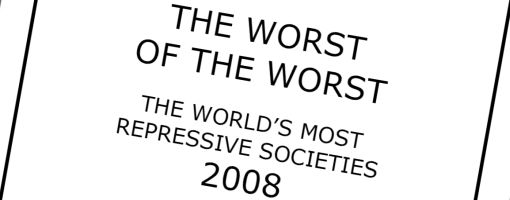
In a report launched May 6th 2008, American NGO Freedom House rates the situation for political rights and civil liberties in the occupied Western Sahara on the same level of countries such as Saudi Arabia, Zimbabwe and Belarus.
6th of May, Freedom House launched a report "The worst of the worst: The world's most repressive societies". Download the report here (890 KB)
Worst of the Worst examines civil liberties and political rights in 17 countries and three territories. The report is taken from excerpts of the upcoming Freedom in the World 2008 report, which assesses the state of freedom in 2007 in every country in the world.
Western Sahara, which is under Moroccan occupation, scores on the same level as Belarus, Chad, China, Equatorial Guinea, Eritrea, Laos, Saudi Arabia, Syria, and Zimbabwe, but before Burma, Cuba, Libya, North Korea, Somalia, Sudan, Turkmenistan, Uzbekistan, Chechnya and Tibet.
"Each of these countries is characterized by widespread human rights violations and the systematic denial of a broad range of freedoms," said Aili Piano, managing editor of the report. "We offer this report in the hope that it will assist the democratic world in pressing the case for freedom at the United Nations and other forums.", he said.
In Western Sahara it is offered "very limited scope for private discussion while severely suppressing opposition political activity, impeding independent organizing, and censoring or punishing criticism of the state", the report says..
The report's section on Western Sahara reads the following:
"As the occupying force in Western Sahara, Morocco controls local elections and works to ensure that independence-minded leaders are excluded from both the local political process and the Moroccan Parliament.
Western Sahara is not listed separately on Transparency International's Corruption Perceptions Index, but corruption is believed to be at least as much of a problem as it is in Morocco.
According to the Moroccan constitution, the press is free, but in practice this is not the case. There is little in the way of independent Sahrawi media. Moroccan authorities are sensitive to critical reporting that contradicts the states position on Western Sahara, and will expel or detain Sahrawi, Moroccan, and foreign reporters who cross the line. Online media and independent satellite broadcasts are largely unavailable to the impoverished population.
Nearly all Sahrawis are Sunni Muslims, as are most Moroccans, and Moroccan authorities generally do not impede their freedom of worship. There are no major universities or institutions of higher learning in Western Sahara.
Sahrawis are not permitted to form independent political organizations, and their freedom of assembly is greatly restricted. Moroccan authorities regularly use force when quelling demonstrations and riots in Sahrawi towns and villages. In 2007, there were fewer cases of violent crackdowns on demonstrators. Sahrawis are technically subject to Moroccan labor laws, but there is little organized labor activity in the poverty-stricken region.
Particularly during the 1961-99 reign of Morocco's King Hassan II, Sahrawis who opposed the regime were summarily detained, killed, tortured, and 'disappeared' by the thousands. While the situation has improved since the 1991 ceasefire and the coronation of King Mohamed VI, pro-independence Sahrawis are still are detained, harassed, threatened, and in some cases tortured.
International human rights groups have criticized Morocco's human rights record in Western Sahara for decades. A highly critical September 2006 report by the UN High Commissioner for Human Rights - intended to be distributed only to Algeria, Morocco, and the Polisario - was leaked to the press that October. The human rights situation in the territory tends to worsen during periods of increased demonstrations against Moroccan rule, as was the case in 2005. For their part, the Polisario have also been accused of disregarding human rights.
Morocco and the Polisario both restrict free movement in potential conflict areas. Morocco has been accused using force and financial incentives to alter the composition of Western Sahara's population.
Sahrawi women face much of the same cultural and legal discrimination as Moroccan women. Conditions are generally worse for women living in rural areas, where poverty and illiteracy rates are higher."
Read more about the report here.
Order our Western Sahara poster!
“Try to Visit Western Sahara”…
The Security Council fails Western Sahara and international law
On 31 October 2025, a new resolution was adopted in the UN Security Council calling on the Saharawis to negotiate a solution that would entail their incorporation into the occupying power, Morocco.
Saharawis Demonstrate Against Trump Proposal
The United States has proposed in a meeting of the UN Security Council on Thursday that the occupied Western Sahara be incorporated into Morocco.
Skretting Turkey misled about sustainability
Dutch-Norwegian fish feed giant admits using conflict fishmeal from occupied Western Sahara. Last month, it removed a fake sustainability claim from its website.



